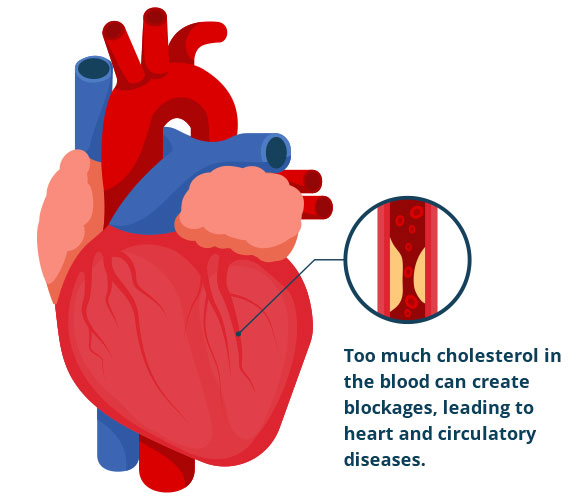9 Causes and Risk Factors for High Cholesterol to Watch Out For
Cholesterol is important in the body as it enables the body to build healthy cells. It is present in every cell of the human body with an important role when it comes to producing hormones, digesting foods, and generating vitamin D. While it is crucial, high levels of it can be harmful. High cholesterol is one of the leading causes of heart disease.

There are two types of cholesterol:
- High-density lipoproteins [HDL], or “good” cholesterol
- Low-density lipoproteins [LDL], or “bad” cholesterol
With high cholesterol, fatty deposits develop in the blood vessels and as they grow, they inhibit blood flow in the arteries. These fatty deposits sometimes break forming a clot that can cause a stroke or heart attack.
Although sometimes genetic, high cholesterol can also result from poor lifestyle choices. Fortunately, as these lifestyle choices can be changed, high cholesterol can be prevented and treated.
Symptoms
High cholesterol has no visible signs and the only way to detect is through a blood test.
When to get tested
Children and young adults between the ages of 9 and 11 get tested once and again between the ages of 17 and 19. For adults, a test is important once five years. These tests are done when there are no risk factors for heart disease.
For those with risk factors, it is recommended that you
carry out more tests and it is now easy to carry cholesterol
tests at labwork365.com from your home so you don’t have to schedule
multiple appointments with your doctor.
Causes and Risk
factors
There are several factors that influence the levels of cholesterol in a person. The most common ones are weight, diet, age, genetics, lifestyle, and diseases.
Weight
Overweight people tend to have high levels of cholesterol and lower HDL levels. The location to which the excess weight is predisposed also increases the risk of having high cholesterol levels with the midsection being the most dangerous.
Diet
Consuming too much-saturated fat can cause high cholesterol. Most saturated fats come from animals such as eggs, red meat, lard, and shrimp. Packaged foods such as cocoa, butter, palm oil, coconut oil also contain saturated fats.
Family genetics
High cholesterol can be inherited from family members. If one of your close kin has high cholesterol, you are also likely to develop the disorder. Inherited high cholesterol tends to be very high, at almost 300 mg/dL. This cholesterol often manifests itself on their tendons or under the eyelids.
However, hereditary cholesterol is rare and when detected can be treated with an early diagnosis.
Diabetes
Diabetic people and those prone to diabetes are at risk of developing high cholesterol and must, therefore, keep their blood sugars within normal limits.
Alcohol consumption
High cholesterol levels can be linked to too much alcohol consumption. Regular heavy drinkers have high cholesterol levels, triglyceride, and blood-borne fat-related risks than nondrinkers.
Smoking
Cigarette smoke damages the walls of blood vessels, making them more likely to accumulate fatty deposits. Smoking can also lower HDL level, which is the good cholesterol.
Lack of exercise
Lack of exercise can raise LDL cholesterol and lower HDL cholesterol. Increased exercise has the opposite results and also helps you lose weight.
Gender
After menopause, women LDL cholesterol goes up, and the risk for heart disease also increases.
Age
High cholesterol may increase as you get older. This is because your body’s chemistry changes as you age, and the risk for high cholesterol rises. For example, Women above the age of 55 and men above 45 years are more likely to develop high cholesterol than younger adults.
Prevention
High cholesterol can be prevented or reversed by changing an unhealthy lifestyle and adopting a healthier approach to life.
Post Your Ad Here
Comments